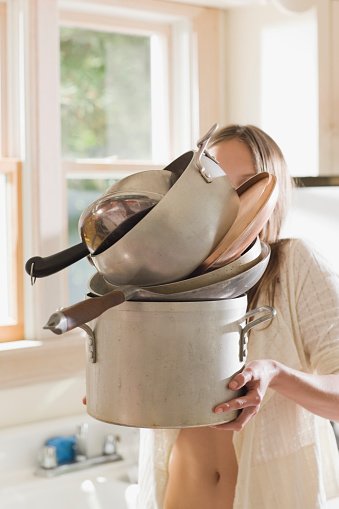Sean De Burca / Getty Images
Most of us have some type non-stick cookware in our kitchens. It’s popular because it’s easy to cook with, easy to clean and some of it can be relatively inexpensive. But despite its popularity, not many of us know how to care for our non-stick cookware properly. Since it isn’t as durable as cast iron and stainless steel, it is important to follow certain steps to extend its lifespan for as long as possible. Especially since you may even be damaging your non-stick cookware without realizing it.
Non-stick cookware can last for years with proper care and maintenance. Here are some basic guidelines and suggestions for how to clean and care for it:
Non-Stick Cookware Care Rules:
- Never use metal utensils on your non-stick pan. They can scratch and ruin the non-stick surface of your cookware.
- Clean your pans with scratch-proof non-scouring pads. Again, scratching can ruin your non-stick cooking surface. It is better to soak your pans and use a rubber spatula or scrubber to clean them.
- Clean and dry your non-stick pans after using, and hand washing is best! If I can wash things in the dishwasher, I do. My dishwasher is my favorite shortcut. But for non-stick cookware, it is a no-no. And be sure to hand-dry to remove all water so rust doesn’t form on your pans.
- Use gentle detergents. Most dishwasher detergents are harsh and hard on non-stick pans. Liquid detergent like Dawn and hand washing is much gentler on your cookware.
- Avoid high heats when using your non-stick cookware. Most cookware comes with a label saying what the heat limit. If you aren’t sure what yours is, it is best to assume it is 375 degrees to be safe and avoid warping.
- Avoid major water temperature changes.Taking a hot pan and submerging it in cold water can cause a non-stick pan to warp. Be sure to let your pan cool for a few minutes before treating it with cold water.
- Avoid aerosol cooking sprays. These sprays cause build-up and, overtime, can ruin your pans. When using non-stick cookware it is best to use non-aerosol oil pumps or a little bit of oil directly into the pan.
- Know when it’s time to retire a pan. The average life span of a nonstick pan is around five years. I’ve had some high-quality nonstick pans longer than that, but I also don’t use them as frequently as other pans in my kitchen. You’ll know your nonstick pan is on its last days if the surface becomes pitted or starts to peel.
More Cleaning Tips:








